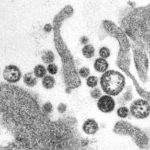The new Indian variant of the COVID virus that’s been detected in the UK has all the hallmarks of a very dangerous virus.
It has two new significant mutations in the spike protein that help it infect cells and evade the immune system.
New figures from Public Health England (PHE) show there have been 73 cases detected in England and another four in Scotland.
The variant – officially named B.1.617 – is almost certainly playing a part in the very sharp spike in the epidemic in India.
Live COVID updates from across the UK and around the world
It has been detected in at least five Indian states that are hotspots for the surge, with more than 200,000 new cases of COVID detected nationwide on Wednesday.
One of the concerning mutations, called L452R, is also found in a variant circulating in California, though there is no link between the viruses. The Indian variant has evolved independently.
Please use Chrome browser for a more accessible video player
The other mutation in the virus is completely new. It is at the same ‘484’ position in the spike protein that is also mutated in the South African variant, and some others. But the actual mutation – E484Q – is slightly different.
Lab tests show both mutations help the virus to infect human cells and evade some antibodies.
The combination – called a double mutant – is a particular concern.
As yet it is unknown what impact they would have on the effectiveness of the existing vaccines.
The discovery of so many cases of the Indian variant in the UK highlights the flaw in relying on a traffic light system for controlling international spread of potentially dangerous viruses.
India is not on the red list so there is no requirement for hotel quarantine. Instead returning travellers are required to take two COVID tests and quarantine at home for 10 days.
But if people don’t fully quarantine there is a risk of the virus escaping.
Research shows the South African variant was brought into the country several times before travellers from some African countries were told they had to quarantine in a hotel.
And latest PHE figures show there have been 56 more cases of the South African variant detected in the UK in the last week as the virus continues to spread, with the total now 600.






















